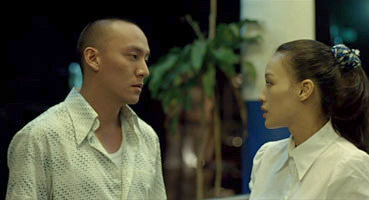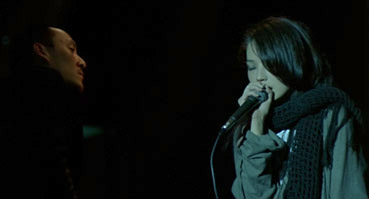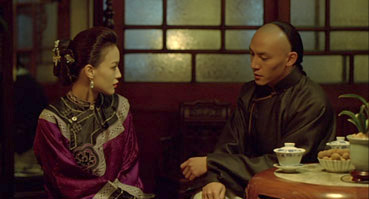|
It's
fair to say that in critical circles, or at least a fair
few of them, the work of Taiwanese director Hou Hsiao-hsien
is held in very high regard. He is not without his detractors,
of course, many of whom were were openly dismissive of his
2003 Ozu Yasujirō tribute Café Lumiére
[Kôhi Jikô], a minimalist study
of the small details of everyday life that emulated Ozu's
style, but not his warmth and engagement with character.
To get the most out of Café Lumiére,
it's best to forget the whole Ozu connection, which Hou
appears to have used as a springboard to go his own sweet
cinematic way.
There
may be more narrative to his three-story latest, Three
Times [Zui hao de shi guang],
but minimalism is still the name of the game, and if you're
looking for tales with complex twists and turns then you've
picked the wrong DVD. These are three stories of relationships
from three different time periods, with the lead characters in each
played by the same two actors. All are seemingly simple in structure
and all are left teasingly unresolved.
The
first tale, A Time for Love, is set in 1966 and
centres around Chen, a young man heading off for military
service and who, before departing, attempts to express his feelings
to Haruko, a woman who hangs around the snooker hall he
has been frequenting. When he returns on leave, Haruko has
gone, but Chen soon becomes enraptured by her successor, May.
Again he is called back to service – is history destined
to repeat itself? A Time for Freedom takes place
in a brothel in 1911, when Taiwan was under Japanese control.
Ah Mei is a concubine who has fallen for one of her regular
clients, Chang, a diplomat and activist whose passion for
political change appears to have blinded him to to the feelings
of the woman whose company he enjoys. A Time for Youth
lands us in 2005, where bisexual singer Jing neglects the
feelings of her girlfriend when she starts an affair with
photographer Zhen.

Despite
a similarity in pacing, the three stories each have their
specific stylistic tics. A Time for Love, with
its warm tones, emotive use of period pop ballads, and playfully
hesitant approach to what may or may not develop into a
relationship, has more than a hint of Wong Kar-Wai about
it (the film's cinematographer, Pin Bing Lee, also shot
Wong's In the Mood for Love, another tale
of hesitant love) and is unquestionably the most warm-hearted
and fully formed of the three tales. It's also one tinged, perhaps, with
nostalgia for a more innocent time (it is, Hou reveals in
the interview on this disc, based on an experience of his
own when he was awaiting military service). The first half
of the tale takes place largely within the snooker hall
where Chen first meets May and is observed from a single viewpoint,
placing us almost in the position of a bystander who pieces
the story together from the fragments we observe and overhear. It's
a pleasingly subtle and involving approach that appropriately
matches Chen's own uncertainty, and its use of Rain
and Tears by Aphrodite's Child had me humming the track for
some time after the film had ended.
A
Time for Freedom is almost unique in modern dramatic
cinema by playing effectively as a silent film, with all
dialogue muted and represented by intertitles, the soundtrack
comprised of gentle piano music and the songs of the concubines,
which is the only 'live' sound in the piece. Hou states that
this approach was chosen because he wanted the period dialect
to be authentic and there was not enough time for the actors to
learn it. As a cinematic device it is inevitably a little
distancing, a layer of artificiality that provides us with
the words but not their inflection, but as a symbol of the
oppression of freedom and specifically free speech in occupied Taiwan it nonetheless
feels appropriate. Set entirely inside the brothel and largely
in Ah Mei's chamber, it is again structured as a series of
time-separated meetings and is an intriguing piece, Ah Mei's
dreams of personal freedom being symbolic of those Chang has for
his country. This is the only one of the stories in which
Hou's intended political undercurrents are clearly evident.
The
opening shot of A Time for Youth, as Zhen and his
female passenger sit on a motorbike and hurtle down
a freeway in modern concrete Taipei, signals a shift in
style from the previous two episodes, an opening up to include
a wider range of locations, although the pace remains as
measured as before. Again, you'll be required to piece things
together, and it's deceptively easy to lose your way, despite
the straightforward narrative – I had to watch it twice
to be absolutely sure of just who was involved with whom
and in what capacity.
Music is once again key, with Jing's on-stage number proving
surprisingly hard to shift from the head. Sound is also
symbolically used, the restrained mix found on the first
two stories giving way to the louder, more ear-catching
surround sound of modern city life.

As
stand-alone stories, only the first really holds its own
in narrative terms, and even that deliberately leaves us wondering, playing as it does like the
first half of a story that could could have multiple outcomes.
But all three are designed to be seen in relation to each
other, and in that context there is more to analytically chew on. In
each case there is a seeming inability to communicate between
couples, whether it be due to shyness or self-absorption,
and the written word often proves more revealing than its spoken equivalent,
with the letters of the first two stories updated to text messages,
emails and blogs in the third. The nature of relationships
evolves through time, the formality of Chang's meetings
with Ah Mei contrasting with the back-to-your-flat-for-a-quick-one
affair between Jing and Zhen, the comparative innocence
of Chen's pursuit of May held up almost as an idyll. There
is certainly a sense here that the time for true love and
uncomplicated happiness has come and gone, and it's possible
to read the final story as a critique of modern attitudes
to relationships, with sex taking precedence over love, and the bisexual,
almost nihilistic Jing unsure of what she really wants and
left miserable by the results of her indecision.
There
is a continuity that goes beyond the pace, the storylines and
the performers, one nested in the recurrence of
ideas, images and behaviour that alters to suit the different
settings and characters. As Chen cycles to the snooker hall,
for instance, the camera looks back at him to focus on his
cheerful enjoyment of life, while his simple mode of transport
feels representative of innocent times. Later, the viewpoint is
reversed as the camera chases to catch up with stony-faced Zhen, his motorbike a symbol of a technological
age, the purpose of his journey to transport his passenger
to his apartment for sex. Similarly, in two of the stories
the male character is intermittently separated from his
female companion by politics, as Chen is called back to
military service and Chang travels to further the cause
of revolution, but while the former is undertaken with reluctance,
the latter is embarked on with enthusiasm. Both men write
to their womenfolk, but Chang's letters talk not of love, but
of his experiences and the changing times.
Whether
you share Hou's views on matters of love or not, there is
still much here to admire and enjoy, in the direction, the
cinematography, the social, political and cultural undercurrents,
the atmosphere and sense of place, and especially the performances
of Shu Qi and Chang Chen, who in each of the stories create
characters that are distinctive enough for you to forget
that they are played by the same actors. As with Café
Lumiére, there is sometimes the sense that
we are being invited to discover layers and meaning to the
film that may not actually be there, or at least consciously
intended, a view reflected in the wildly varying critical
estimates of the film's true content and qualities. It's
nonetheless a film experience that for my money is absolutely
worth having, as any quibbles I may have with the second
and third stories are largely compensated through the handling,
the detail, the two lead performances, and A Time for
Love, which could, with expansion, make for an intriguing
film in its own right.
The
imagery in Three Times is the sort that
can present real problems for DVD if not encoded with care,
with lighting varying from bright daylight exteriors to
the lamplight of Ah Mei's quarters or the partial gloom
of the snooker hall. Thankfully, all are reproduced impressively
here, with nary a sign of compression artefacts, and blacks
looking solid whatever the light levels, and with no obvious
loss of shadow detail. Sharpness is impressive throughout,
and the colour reproduction – as evidenced in the night-time
neon of A Time for Youth or the handsome inter-titles
of A Time for Freedom – is excellent. The image
is framed 1.85:1 and anamorphically enhanced.

There
are two soundtracks available, stereo 2.0 and surround 5.1,
both in the original Chinese. The stereo track is noticeably
louder than the surround track, which is considerably more
subtle in its spread, to the point that I began to prefer
the stereo track. But when the third story kicks in the
surrounds go to work, landing us slap-bang in the modern
age and filling the room with the noise of the city.
Interview
with Hou Hsiao-hsien (25:48)
What looks like an extra feature from a French DVD release
that has been subtitled in English proves an interesting
companion to the film, as Hou talks about the stories themselves,
the cast, the political and cultural elements, and how closely
the first story resembles his own experiences. I'd almost
completed my review when I watched this, and was interested
to hear him confirm some of the things I'd suspected about
the first and last stories. This includes some footage of
Hou and his two leads at Cannes.
Three
Times Trailer (2:32)
A wordless and appropriately paced promotion cut to the
piano music from A Time for Freedom.
There
are also Filmographies for Hou
Hsiao-hsien and Shu Qi.
A
dreamily paced, lovely-looking and always interesting trilogy
of tales whose surface simplicity sits atop a seductive
suggestiveness that not everyone will respond to, and could
well be saying less than it seems to suggest. But
I really did discover detail and links between the stories
on the second viewing that I missed the first time round,
and have no doubt will find still more on the third visit,
giving the disc definite replay value. And as always with
Hou, when it works, it works divinely.
|